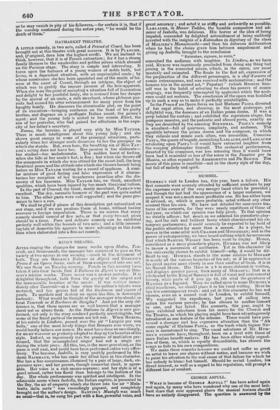KING'S THEATRE.
AFTER ringing the changes for many weeks upon Medea, Ton- credi, andt-Senziranzide, the manager has contrived to give us the variety of two operas in one evening —much tO the detriment of both. They are ROSSINI'S Italiana in Algeri and GNECCO'S Prova un Opera Serhe, each of them compressed into one act. We saw them on Tuesday evening. People in this country have taken it into their heads that L'hu/itina in Algeri is one of Ros- sisa's inferior . works. There never was a greater mistake. It is delightful throughout, both from the gayety of the suhjeet and the innumrable beauties of the music. It was written imme- diately after Taucredi—at a time when the author's talents were matured, and his genius full of the freshness and vigour of youth. To mutilate and destroy an opera like this, is downright barbarity. What would be thought of the manager who should so treat Tancredi or ii &whim de Siviglia, And yet the only dif- ference is, that these operas are so well known that a manager durst not so abuse them. As the ltaliana in Algeri is now per- formed; not only is the story rendered perfectly unintelligible, but some of the finest parts of the music are left out. When Ruumn, at his entree in 'Lindoro, passed over the air " Languir per una belle," one of the most lovely things that Bossily' ever wrote, we could hardly believe our senses. He must have done so unwillingly, for no air was ever so perfectly adapted to display the beauties of his style. Indeed, so ingeniously was the process of mutilation per- formed, that the accomplished singer had not a single air during the whole piece. All this, too, is the more provoking, as the piece is well cast, and could have been performed entire very effec- tively.' The heroine, Isabella, is very prettily performed by Ma- dame RAIMBAUX, who has made her debut here in this character. She has a fine countenance, illumined by a pair of large, dark, ex- pressive eyes ; and her person, though somewhat short, is agree- able. Her voice is a rich mezzo-soprano ; and her style is of a good school, rather less florid than belongs to the fashion of the day. Her whole performance was spirited and intelligent. In the admirable scene where Isabella, the Italian captive, is presented to the Bey, the air of coquetry which she threw into the air " Mala- tmtta della sorte" was exceedingly piquant, and completely brought out the author's design. SANTINI'S Mustafa was much as usual—that is, he sung his part with a fine, powerful voice, and great accuracy ; and acted it as stiffly and awkwardly as possible: LABLACHE, in Messer Tadcko, the humble companion and ad- mirer of Isabella, was delicious. His horror at the idea of being impaled, succeeded by delighted astonishment at being suddenly invested with the insignia of a Kaimahan (a dignitary of the class of MOLIERE'S Mamamouchi—and then his dolorous deliberation when he had the choice given him between empalement and. giving up habella, brought to the conclusion
" Kaimakan, signore, to resto,"
convulsed the audience with laughter. In Lindoro, as we have said, RUBINI was ingeniously precluded from doing any thing but Joining in the concerted pieces, which, in the opera, are most masterly and animated. The finale to the first act, expressive of the perplexities of the different personages, is a chef dauvre of comic extravagance, and was received with acclamations; and the famous trio in the second act," Papataci" (which Bossily! him- self was in the habit of selecting to show his powers of comic singing), was frequently interrupted by appla.uies which the audi- ence could not restrain. The conclusion of the opera was huddled up in such a way as to make it perfectly unintelligible. In the Prova un Opera Seria we had Madame PASTA divested of her regal attire, and showing, in the most grotesque, yet delightful way, the humours of an Italian prima donna. It was a peep behind the curtain ; and exhibited the capricious singer, the pompous maestro, and the pedantic and absurd poeta, exactly as they are described by the amusing STENDHAL. PASTA'S comedy is excellent—full of quietness, simplicity, and archness. The squabble between the prime donna and the composer, in which they ridicule and mimic each other, was irresistible. Conceive PASTA, the queen of tragedy, mimicking LABLAcns, and LA.BLACHB retaliating upon PASTA !—it would have extracted laughter from
the weeping philosopher himself. The orchestral performance, directed by the composer, was less amusing than it would have
been had it reminded us less of the scene in the Fanatico per la Musica, so often repeated by AMBROGETTI and DE BEGNIS. The music of this piece is excellent—not in the showy style of the day, but full of melody and spirit.


























 Previous page
Previous page